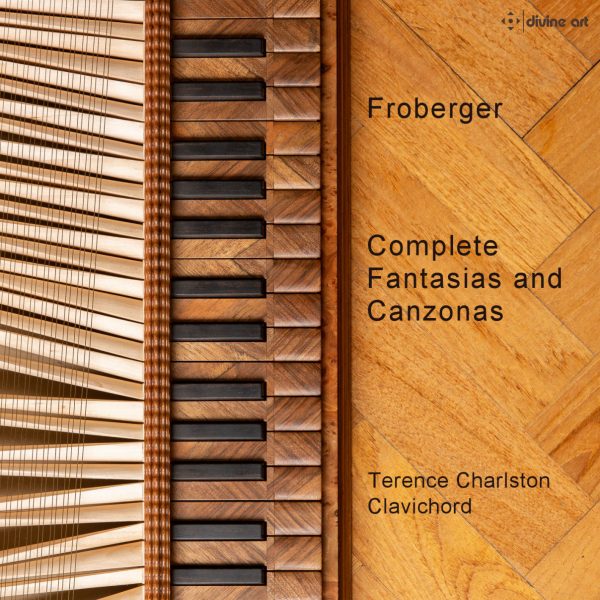The keyboard works of Johann Jakob Froberger are no strangers to the world of Baroque music. Like his Italian counterpart, Girolamo Frescobaldi, he enjoyed a reputation for enhancing the keyboard literature of his time. Most of his works have been recorded on the harpsichord, and the toccatas and partitas, with their importance in the development of German organ music, on that particular instrument. Here, keyboardist Terence Charlston has chosen to record the set of fantasias and canzonas on a clavichord. As one might note, this is an extremely intimate instrument, meant largely for in-home performances, as it has the resonance of library silence. That is not to say that the instrument is not versatile, but it was generally used by composers up through the Classical period as a means of trying out their works or performances where the chambers were quite small.
Since these have been recorded quite frequently before, little needs to be said about the music itself. The fantasias are finely crafted pieces, with only the first, based upon a hexachord scale, lasting for a length of time. Charlston has chosen this instrument as a means of demonstrating that Froberger’s works are eminently adaptable to this more controlled private instrument. In a sense, he has succeeded, though throughout the action that often elicits a more sonorous rendition is reduced to a more cautious approach. The notes are played as if the music minces right along, and this is primarily the result of the instrument itself. Charlston notes that it “creates a new and very different aural experience,” which could apply not just to Froberger, but any other keyboard composition of this period. I recall early attempts to perform Emmanuel Bach’s fantasias on the clavichord, and these were rather less successful without some extreme microphone enhancements of the duller sound of the instrument. The same can be said for this disc.
On one hand this is good to have, as the clavichord was an important household instrument of the time, and certainly Froberger’s music would have been performed on it as the occasions presented. Likewise, Charlton’s execution of these works is quite deft, if a bit on the cautious side. For most, however, unless you want to hear these often complex works on a soft, non-resonant instrument as a documentary performance, this disc probably won’t be appealing.
@divineartrecordingsgroup
A First Inversion Company
Registered Office:
176-178 Pontefract Road, Cudworth, Barnsley S72 8BE
+44 1226 596703
Fort Worth, TX 76110
+1.682.233.4978
We noticed you're visiting from Latvia. We've updated our prices to Euro for your shopping convenience. Use Pound sterling instead. Dismiss





![🎧 Listen now to the @purcellsingers' first single from their upcoming album, #ASpotlessRose! ➡️ listn.fm/aspotlessrose [in bio]](https://scontent-dfw5-2.cdninstagram.com/v/t51.71878-15/642752592_1424641949105789_8815810652567824072_n.jpg?stp=dst-jpg_e35_tt6&_nc_cat=106&ccb=7-5&_nc_sid=18de74&efg=eyJlZmdfdGFnIjoiQ0xJUFMuYmVzdF9pbWFnZV91cmxnZW4uQzMifQ%3D%3D&_nc_ohc=aY1NGfNpOoYQ7kNvwE95qN8&_nc_oc=AdkiQK0NYcCCjVpyiJOTHWMbXoPSssU5f0lV2p3CKnGVY-TTzYrv_dyBZPx62gXAfHw&_nc_zt=23&_nc_ht=scontent-dfw5-2.cdninstagram.com&edm=ANo9K5cEAAAA&_nc_gid=6VqUX83yx6rZRM_KH2mbsw&_nc_tpa=Q5bMBQGA4o3rqpwdwzpruw0wIfVeHmNS3_6yjMMnmgY6EWTBmwbe-NjbcudJ1ZdUGMYN2Rbwr6ti0Y9tlw&oh=00_AfxDmzjzD495AzB6Q2N2H-w6AYixLO_0JZ-lI2kVqJUS0A&oe=69AED481)






